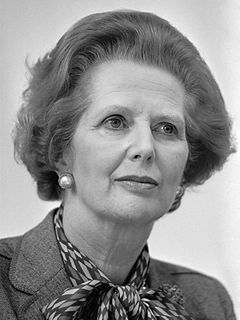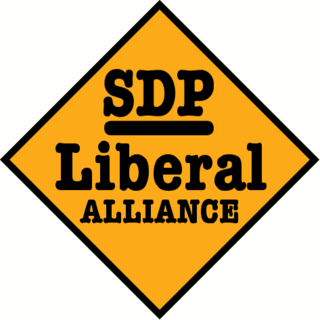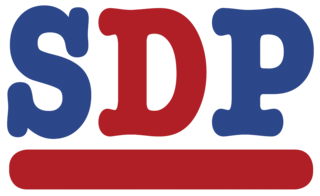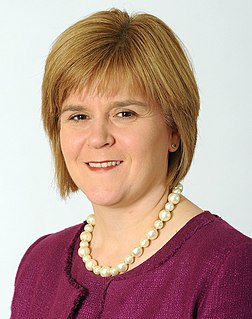
The 1983 United Kingdom general election was held on Thursday 9 June 1983. It gave the Conservative Party under the leadership of Margaret Thatcher the most decisive election victory since that of the Labour Party in 1945.

The 1987 United Kingdom general election was held on Thursday 11 June 1987, to elect 650 members to the House of Commons of the United Kingdom. The election was the third consecutive general election victory for the Conservative Party, and second landslide under the leadership of Margaret Thatcher, who became the first Prime Minister since the Earl of Liverpool in 1820 to lead a party into three successive electoral victories.

The SDP–Liberal Alliance was a centrist political and electoral alliance in the United Kingdom. Formed by the Social Democratic Party (SDP) and the Liberal Party, the Alliance was established in 1981, contesting the 1983 general election, 1984 European election and 1987 general election. The Alliance ceased to exist in 1988, when the two component parties merged to form the Social and Liberal Democrats, later renamed the Liberal Democrats.

David Anthony Llewellyn Owen, Baron Owen, is a British politician and physician.
The Greenwich by-election of 1987 was a by-election to the British House of Commons held on 26 February 1987, shortly before the 1987 general election. The election was caused by the death of Guy Barnett, Labour Party Member of Parliament for Greenwich on 24 December 1986.
A by-election was held for the British House of Commons constituency of Vale of Glamorgan on 4 May 1989 following the death of Conservative MP Sir Raymond Gower.

The 2011 Scottish Parliament election was held on Thursday, 5 May 2011 to elect 129 members to the Scottish Parliament.

A Glasgow Hillhead by-election was held on 25 March 1982. The by-election was caused by the death of the Conservative Party Member of Parliament for Glasgow Hillhead Tam Galbraith on 2 January 1982.

Charles Peter Kennedy was a Scottish Liberal Democrat politician who was Leader of the Liberal Democrats from 1999 to 2006, and a Member of Parliament (MP) from 1983 to 2015, latterly for the Ross, Skye and Lochaber constituency.

Local elections were held in the United Kingdom in May 1981. The results were a mid-term setback for the Conservative government, which lost 1,193 seats, leaving them with 10,545 councillors. The projected share of the vote was more respectable for the government, however: Labour 41%, Conservatives 38%, Liberals 17%. This was in spite of opinion polls showing a much wider Labour lead over the Conservatives. These were the first elections to be contested by Labour under the leadership of Michael Foot, who had succeeded James Callaghan in late 1980.

Local elections were held in the United Kingdom in 1982. The elections coincided with rising popularity of the Conservative government and Prime Minister Margaret Thatcher, which was mostly attributed to the Falklands War. The projected share of the vote was Conservatives 40%, Labour 29%, Liberal-SDP Alliance 27%.

Local elections were held in the United Kingdom in 1984. There was a slight reversal in the Conservative government's fortunes, but the party remained ahead. The projected share of the vote was Conservatives 38%, Labour 37%, Liberal-SDP Alliance 21%.

Local elections were held in the United Kingdom in 1985. The projected share of the vote was Labour 39%, Conservative 32%, Liberal-SDP Alliance 26%. Labour had the largest share of the vote in local council elections for the first time since 1981.

Local elections were held in the United Kingdom in 1987. The projected share of the vote was Conservatives 38%, Labour 32%, Liberal-SDP Alliance 27%. It was the first time since 1983 that the Conservatives had enjoyed the largest share of the vote in local council elections.

Regional elections were held in Scotland on Thursday 6 May 1982, as part of the wider 1982 United Kingdom local elections. Whilst the 1982 elections saw the Conservatives hold up relatively well in England, the Tories did comparatively poorly in Scotland, where their already disadvantageous position worsened. The Conservatives did particularly poorly in Strathclyde, where the Conservative group leader lost his seat.
The Broxbourne Council election, 1982 was held to elect council members of the Broxbourne Borough Council, the local government authority of the borough of Broxbourne, Hertfordshire, England.

The Social Democratic Party (SDP) was a centrist political party in the United Kingdom. The party supported a mixed economy, electoral reform, European integration and a decentralized state while rejecting the possibility of trade unions being overly influential within the industrial sphere.

The 2015 United Kingdom general election in Scotland was held on 7 May 2015 and all 59 seats were contested under the first-past-the-post electoral system. Unlike the 2010 general election, where no seats changed party, the Scottish National Party (SNP) managed to win all but three seats in Scotland in an unprecedented landslide gaining a total of fifty-six seats and also become the first party in sixty years to win 50% of the Scottish vote. It saw the Labour Party suffer its worst ever election defeat within Scotland losing 40 of the 41 seats they were defending, including the seats of Scottish Labour Party leader Jim Murphy and also the then Shadow Foreign Secretary Douglas Alexander. The Liberal Democrats lost ten of the eleven seats they were defending with the then Chief Secretary to the Treasury Danny Alexander and former leader Charles Kennedy also losing their seats. The election also saw the worst performance by the Conservative Party which received its lowest share of the vote since its creation in 1965, although it retained the one seat that it previously held. In all, 50 of the 59 seats changed party, 49 of them being won by first-time MPs.
Elections for the London Borough of Merton were held on 6 May 1982 to elect members of Merton London Borough Council in London, England. This was on the same day as other local elections in England and Scotland.

Elections for the City of Edinburgh District Council took place on Thursday 3 May 1984, alongside elections to the councils of Scotland's various other districts.











